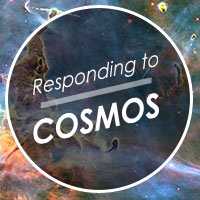 Education
Education
 Evolution
Evolution
 Faith & Science
Faith & Science
It Was the Philosophical Message, Not the Science, that Moved the Creators of Cosmos
We have written a lot about the revived Cosmos series that concluded on Sunday, but one thing I still find curious. A lot of smart people spent a lot of money in laboring on these 13 episodes but I could never identify the organizational principle they were working from.
 Think of the program as a book with 13 chapters. Now take a look if you want at the Wikipedia article on Cosmos where there’s an objective rundown of what each episode included, from the opening moment when President Obama endorsed the enterprise by praising the “spirit of discovery.” (See above.) If this were a book it would be a very disorganized, stream-of-consciousness, “one damned thing after another” type of affair.
Think of the program as a book with 13 chapters. Now take a look if you want at the Wikipedia article on Cosmos where there’s an objective rundown of what each episode included, from the opening moment when President Obama endorsed the enterprise by praising the “spirit of discovery.” (See above.) If this were a book it would be a very disorganized, stream-of-consciousness, “one damned thing after another” type of affair.
Cast your mind back. If Cosmos were a book, the chapters would go as follows: Giordano Bruno, how the geocentric model of the universe was overthrown, the Cosmic Calendar, tribute to Carl Sagan (Episode 1); evolution of life on Earth and hypothetically other planets, extinctions, meet the tardigrade, extraterrestrial life (Episode 2); Halley and Newton, comets (Episode 3); the speed of light, gravity, black holes (Episode 4); the nature of light, Chinese philosopher Mozi (of “Against Faith” fame), William Herschel (Episode 5); microorganisms, atoms, neutrinos (Episode 6); age of the Earth, toxicity of lead in the environment, other environmental threats (Episode 7); stars, how we’re nothing more than star stuff (Episode 8); history of the Earth, plate tectonics, extinction events (Episode 9); electromagnetism, Faraday and Maxwell (Episode 10); panspermia, extraterrestrial life, escape from planet Earth (Episode 11); greenhouse effect, global warming, solar energy (Episode 12); cosmic rays, dark matter, dark energy, Voyager probes, Carl Sagan’s “pale blue dot” (Episode 13).
Most episodes all included much else in a spirit of “Oh, by the way.”
See what I mean? If you’ve ever written a book or even a long article, you ought to know two things. First, ultimately you can only say one thing. A book is a unified work bound up coherently by the fact that it pursues a single theme. Second, there should be some logic, preferably simple and easy to grasp, to the way that theme is pursued. Why does one chapter come before another instead of the other way around? Why do you speak of this subject here and this other subject there?
With Cosmos, even the individual chapters often seemed scattered. After watching an episode with my son — we watched most of them together — we were rarely able to say afterward, “That one was about [FILL IN THE BLANK].”
I know the single big point that the creators of Cosmos wanted to communicate: That humankind and planet Earth occupy no special, privileged, inherently meaningful place in the universe. Besides being dubious as science, that is a morally corrosive message to teach young people, the show’s primary intended audience, at a time when we’re morally challenged enough already. Don’t forget, this thing is headed straight for the schools, you can be sure.
But what the producers were thinking when they strung together these episodes, what pattern they had in their minds, I simply can’t see. In that respect, Cosmos is less like a book and more like a rant. A genial one, since Neil deGrasse Tyson is a genial host. When you’re ranting, you don’t give a hoot about the order in which you say whatever you do. Whatever comes to mind, based on the passion that moves you, that’s what you say. Probably it was done this way, and no one noticed, because the philosophical message is what really moved the creators of the series, not the science.
You know, I’m going to pose this question to the several Twitter hashtags where Cosmos fans gather. Whenever I’ve done that up till now, I could count on getting back a bunch of witless insults and catcalls. Here’s one from this morning:
@d_klinghoffer is this a parody account? it’s like the @TheOnion but even more subtle and clever, you brought a tear to my eye, I loved it
— James Steward (@James_Steward) June 11, 2014
But maybe one of these devoted Cosmos enthusiasts will be able to shed light on my question.
I’m on Twitter. Follow me @d_klinghoffer.
